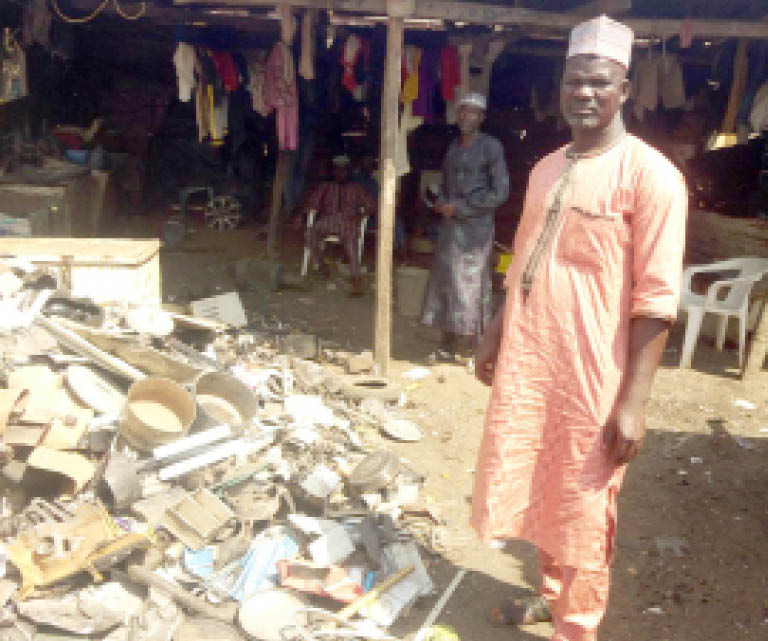Scavenging, scrap trade fulfilling, lucrative, says 40-year-old dealer
They can be seen here and there rummaging refuse dumps, dirty streets and gutters. They are mostly boys and young men, scavenging for used plastic, can and metal products. These young people also deal in metal scraps that are old, discarded products like refrigerators, television sets, pressing iron, electric kettle and vehicle parts. Scavenging and […]

Mallam Umar Yaya
They can be seen here and there rummaging refuse dumps, dirty streets and gutters. They are mostly boys and young men, scavenging for used plastic, can and metal products.
These young people also deal in metal scraps that are old, discarded products like refrigerators, television sets, pressing iron, electric kettle and vehicle parts.
Scavenging and the low-level scrap trade is not only widely considered a dirty job, it’s regarded as an unrewarding engagement for a mere hand-to-mouth survival.
But to 40-year-old Mallam Umar Yaya, ‘Jari Bola’, the Hausa term he proudly expressed for scavenging, is life and fulfilment.
Yaya, a father of seven children, disclosed he went into the scavenging and scrap business 17 years ago in Lagos by slinging a bag over his shoulder and walking the streets and mechanic workshops looking for metallic and plastic odds and ends.
He said, “When I bought the scraps, I took them to my master and he would give me my own gain. But after some time, I left Lagos and came to set up my own business here in Ado-Ekiti. I did the ‘jari bola’ in Lagos for about seven years and have been doing it here in Ado-Ekiti for about 10 years.
“We look for iron scraps to buy for some companies that need them. Also, we look for discarded plates, aluminium products and sometimes plastic items. There are some companies in Ibadan that need them.
“After we bring in these products from various areas, they are measured or weighed. It is the weight that we use in paying for the services of the boys that go to the fields looking for the scraps. I have customers who buy these scraps from me.”
Malam Yaya enthused he has found the business profitable and rewarding as he has been able to feed his family of wife and seven children conveniently.
He said he was applying the income from the trade well to finance the education of his children in primary and secondary schools, as well as use it to meet his family obligations and responsibilities generally.
Hinting that some of his customers are based outside Nigeria, the scrap dealer lamented that the closure of the borders has been affecting his business.
“We don’t get enough money now as we used to do. When we load a truck, it, it no longer brings in money at the right time. We appeal to President Buhari to open the borders so that our business can move very well,” he appealed.
Yaya said he controls about 50 to 60 field workers who supply him with scraps daily, adding most of them had, however, travelled to their various states of origin to farm but would soon be back to Ado-Ekiti to resume work.
“I have only about 15 persons now working for me. I give all my boys money every day after they have brought in scraps. Some receive like N3,000 each, some N5,000. If they are able to gather lots of scraps, some can get N10,000 each,” he said.
Yaya boasted that the scrap business is big and rewarding enough to attract the attention of governments at all levels. “Governments should help us in the business. They should lend us money to run the business. We need help to enable the business grow. In Ekiti, there is no money to run it properly. Our union is not strong. We have the president of the association in Abuja, as we have our Chairman in Ekiti State,” he said.
Like every other business and profession, the scavenging and scrap trade has its own hazards. Yaya narrated how criminal elements occasionally harassed his field workers and stripped them of their goods and money.
Again, he added, there had been instances that people falsely accused scavengers and scrap dealers for missing items.
These would be no discouragement for him to abandon the trade. “I am happy doing the work because I earn income from it, even if it is small, small. I eat from it and train my children. I thank God that if any problem arises, I can tackle it from what I earn here from scavenging and selling scraps,” he said.
